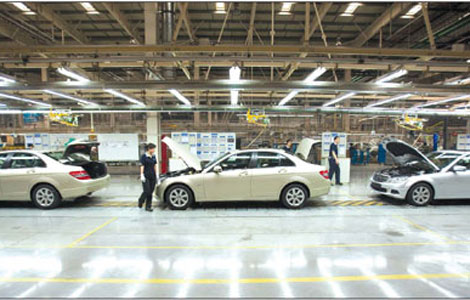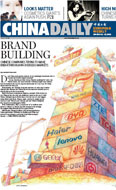Asia
Japanese ordered indoors in radiation leak crisis
Updated: 2011-03-15 13:36
(Agencies)
The impact of the earthquake and tsunami on the world's third-largest economy helped drag down the stock markets Monday, the first business day since the disasters. The benchmark Nikkei 225 stock average fell for a second day Tuesday, by 6.5 percent to 8,999.73, wiping out this year's gains while the broader Topix index lost 7.5 percent.
To lessen the damage, Japan's central bank injected $61.2 billion Tuesday into the money markets after pumping in $184 billion on Monday.
Initial estimates put repair costs in the tens of billions of dollars, costs that would likely add to a massive public debt that, at 200 percent of gross domestic product, is the biggest among industrialized nations.
In a bid to stop the reactors at the nuclear plant from melting down, engineers have been injecting seawater as a coolant of last resort.
Yuta Tadano, a 20-year-old pump technician at the Fukushima power plant, said he was on the second floor of an office building in the complex when quake hit.
"It was terrible. The desks were thrown around and the tables too. The walls started to crumble around us and there was dust everywhere. The roof began to collapse.
"We got outside and confirmed everyone was safe . Then we got out of there. We had no time to be tested for radioactive exposure. I still haven't been tested," Tadano told the reporters at an evacuation center outside the exclusion zone.
"We live about 10 kilometers (6 miles) from the facility. We had to figure out on our own where to go," said Tadano, cradling his 4-month-old baby, Shoma. "I worry a lot about fallout. If we could see it we could escape, but we can't."
"Just because we are in an evacuation center doesn't mean we are safe," said his sister-in-law Makiko Murasawa, 43.
The nuclear crisis has also raised global concerns about the safety of nuclear power at a time when it has seen a resurgence as an alternative to fossil fuels.
The head of the International Atomic Energy Agency said the Japanese government has asked the agency to send experts to help.
The Dai-ichi plant is the most severely affected of three nuclear complexes that were declared emergencies after suffering damage in Friday's quake and tsunami, raising questions about the safety of such plants in coastal areas near fault lines and adding to global jitters over the industry.
Switzerland ordered a freeze on new plants, while Germany said it was suspending a decision to extend the life of its nuclear plants. The United States said it would try to learn from the Japanese crisis but that events would not diminish the US commitment to nuclear power.
"When we talk about reaching a clean energy standard, it is a vital part of that," White House spokesman Jay Carney said.
Meanwhile, 17 US military personnel involved in helicopter relief missions were found to have been exposed to low levels of radiation after they flew back from the devastated coast to the USS Ronald Reagan, an aircraft carrier about 100 miles (160 kilometers) offshore.
US officials said the exposure level was roughly equal to one month's normal exposure to natural background radiation, and the 17 were declared contamination-free after scrubbing with soap and water.
As a precaution, the carrier and other 7th Fleet ships involved in relief efforts had shifted to another area, the US said.
E-paper

Factory fever
Despite auto manufacturing bubble scare, car giants gear up expansion of factories.
Dressed for success
Fabric of change
High spirits
Specials

Earthquake Hits Japan
A massive 8.8 magnitude quake hit the northeast coast of Japan on March 11,2011.

NPC & CPPCC sessions
Lawmakers and political advisers gather in Beijing to discuss major issues.

Panda campaign
Black-and-white bear helps Chengdu in marketing campaign after quake.
